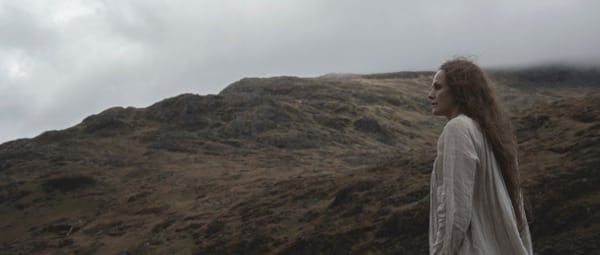Eye For Film >> Movies >> Gwen (2018) Film Review
Gwen
Reviewed by: Andrew Robertson

In the labyrinthine valleys of Wales, as the Industrial revolution wakens and hungers for the minerals buried in hills that it will make holes, green that it will make black, men that it will make machines, there is a farm. A small still place, the father away "in the fighting", a fog of fable almost as palpable a quality of light as the implied miasma of cholera. There is snow in the hills, but the coldness is not only outside.
Gwen lives here. Eleanor Worthington-Cox turned 18 just days before the film's UK premiere, but her experience as an actor is one of the film's great strengths - in the hormonal haze of adolescence, in the liminal geography of fell-farming, in the balance of responsibilities of being eldest child in a fatherless house, on the edge of penury in a land becoming rich, in each of this and any number of other ways she embodies, inhabits, more than capable of carrying the burdens of an eponymous role.

Maxine Peake plays Elen, her mother, and more. In the grip of something not short of seizure, her role becomes ever deeper, more complex. William McGregor has, from these performances and more, crafted something fabulous, in both senses - and that duality is one of Gwen's greatest strengths, there is always more than one thing going on and going on well. A feature debut for McGregor, he's not short of credits with both period and gothic detail, and here, with Adam Etherington's cinematography, has crafted something not short of gorgeous. Nothing seems unreal, even that which might be - dreams of rocky mysteries, rats in the henhouse, all feels visceral, sanguine, bilious, spiteful, wetly organic, haunted.
Between constant animal misfortune and the difficulties of what amounts to a colonial narrative, this is not an easy watch, but the ragged edge of discomfort is a part of its quality. The passage of time in the drift of season marked with visits to chapel, the litanies of ill-luck that would question the faith of even A Serious Man are a greater test to a teenager. In Q&A at 2019's Edinburgh Film Festival there was talk of folkloric study, "a fantasy within a reality", and there's a sense of the same literary complexity as with The Wall, another film about a woman near alone in a valley and more. It is possible, and not inaccurate, to distill this to an "anticapitalist folk horror". Indeed, that precis is precisely what brought Maxine Peake on board. Yet there is as much and as more going on here as at Midsommar, as with The Witch, The Wicker Man's hunger is local legend made ligature, a binding of a place by its tales. This is almost the inverse, a story behind a whispered superstition, the messy detail of a ritual holding of breath years hence, the roots of a tree whose later blossom is a playground rhyme and hurried step.
"Grounded" was a word used in answer to a question, and that sense of the physical informs and channels the uncertainties that the film is filled with. Dinah Collin's costume work is one of these key elements, McGregor described her as the "most experienced" to his credit, and to hers are some 50 years of wardrobe work - here in the realm of inexact genre notes like the wasp-waist of a coat overlarge cinched with a belt tied and not punched to size say as much about time and place as any weave or print. It is possible to set the post- in the pre-modern era, as possible to be both arch and Gothic. I'd earlier referenced colonial narratives and Doctor Wren (Kobna Holdbrook-Smith) raises further questions, there may be a Baron but there are other structures of power here, a different Leviathan, waking.
I can rattle off shorts that sustain a particular mood like this across a smaller space - The Ollaparo, Death In A Nut, The Cull, Mokhtar, In The Fall in particular - but to sustain those tensions across a feature (even one at a spritely 84 minutes) is no small challenge. Helped by the quality of its compositions - visual, in particular the blazing of torches, the still unstill small light of candles, the envelope of mist - aural, James Edward Barker's score and the rest of the sound, "sound rather than music" as discussed at Q&A, things pitched down, soundboxes and soundtubes, the opening wind isn't, it's a song, distorted.
There is magic here - cinematic, certainly, the conjured carcass has been stripped but it's the screen that fleshes the blackened bones to belief - narratively, well, see it and see. There is a weight to everything, the heft of something hewn from human experience, wrung from the perils of filming in Wales in winter, marrow mythological cracked from craft. Delicate, dark, delightful, Gwen is a treasure, but the best kind, not just rare but raw, storied, in that realm where grime and rime become patina and cinema. It is a glowing thing, Gwen, but it cups its candle close, illuminating without enlightening, like an encyphered encyclical - in its flicker it forms a fable, a fine one.
Reviewed on: 14 Jul 2019
















